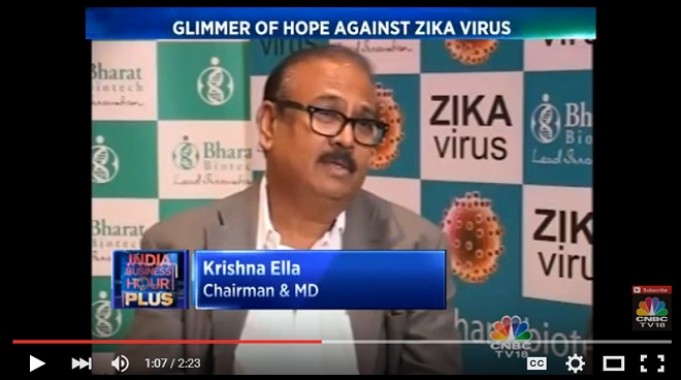Zika vaccine and press release journalism
The Chairman and MD of Bharat Biotech talks about the vaccine
The India media which has rarely done a good job covering science and technology, recently tied itself into knots during its reportage of a supposed vaccine invented by Bharat Biotech to immunise against the Zika virus. Journalist after journalist lapped up the claims by Bharat Biotech with hardly any questions or critical analysis. The only exception was an IANS report by K. Jayaraman, who is perhaps one of the best science journalists in India.
Let’s begin this post-mortem by reconstructing the timeline.
On February 3, 2016 Bharat Biotech held a press conference in Hyderabad and although I’ve not been able to access a video of the conference, the press release is available on the company’s website. This press release was mostly an exercise in self-adulation and remarkably vague on the issue of the purported vaccine.
For example, the press release states “We believe we have an early mover advantage in developing the ZIKAVAC® and we are probably the first in the world to file for a global patent for Zika Vaccine candidates.” It then says, “We have two candidate vaccines in development. One of them is an inactivated vaccine that has reached the stage of pre-clinical testing in animals…Furthermore, a recombinant vaccine using the surface antigens of the virus is being concurrently developed”.
The press release and the resulting news reports are remarkably vague on the timeline for the vaccine to be made commercially available and also the importance of the claimed breakthrough. These are important questions to be answered, especially while giving a company free publicity. A CNN story on a possible Zika Vaccine (unrelated to Bharat Biotech’s claim) does a great job of explaining the complicated and lengthy process to develop a possible Zika vaccine. Sadly none of the Indian reporters did a comparable job in giving their readers useful information.
In a world of accountable journalism, where journalists actually fact-check instead of relying on a company’s press releases, Bharat Biotech would have been asked some basic questions which would have both verified its claims and also provided the reader with some useful information into the complicated world of the development of vaccines.
Some of the questions posed to Bharat Biotech should have been as follows: First, how did Bharat Biotech get hold of the Zika virus? This is a pertinent question because, as reported later by Prasad of the Hindu, Brazil was refusing to share samples of the Zika virus with any other country.
More importantly, the import of viruses into the country is strictly regulated under the Environment Protection Act, 1986 or more precisely, the Rules for the Manufacture, Use, Import, Export and Storage of Hazardous Micro-organisms Genetically Engineered Organisms or Cells. All imports of viruses have to be approved under these rules. Jayaraman was the only journalist who asked Bharat Biotech this question – the company refused to answer.
Second, Bharat Biotech should have been asked if and when it got permission from the Review Committee on Genetic Manipulation (RCGM). This was an important question because the company claimed to invent a recombinant vaccine which means that they were manipulating the gene of the virus. Research involving gene manipulation needs to be approved by the RCGM. Was this done and if so when?
Third, the company should have been asked to provide some details on its ‘global patent application’. Again, only Jayaraman posed this question to Bharat Biotech and the company refused to respond.
Similarly there are serious questions regarding the unqualified reporting of Bharat Biotech’s claim that the ‘Rotovac Vaccine’ was an ‘Innovate in India’ success story. That vaccine was developed in conjunction with Stanford University, the American government, and with funding from multiple sources ranging from the Department of Biotechnology to the Gates Foundation. Whether the vaccine is a success story is also doubtful with some questioning the efficacy of the vaccine. It’s important to point out these issues because the company appears to be embellishing the truth as a part of its branding exercise.
The Indian scientific establishment regularly puts out press releases which are economical with the truth. There are different reasons for doing so. For the private sector, such press releases are usually a branding exercise and if the company is listed, it could result in a minor spike in stock prices.
For the public sector establishment, exaggerated claims about their achievements help to get renewed grants from the government and perhaps public awards. It’s therefore important for journalists not to let themselves be co-opted into the exercise and give these companies free publicity.
Prashant Reddy Thikkavarapu is a lawyer.







